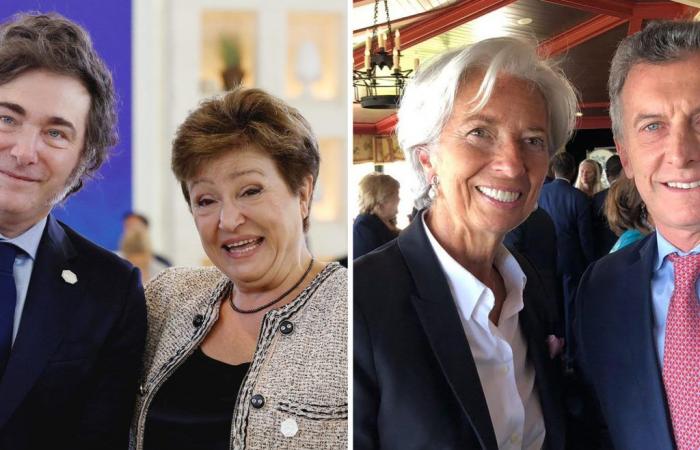In June 2018, the IMF announced from Washington that lent US$50,000 million to Argentina. Two days later, the then president, Mauricio Macri, traveled to a G-7 summit and took a photo with his peers and the head of the Fund as a sign of support.
Six years later the sequence was repeated. Instead of Macri there was Javier Milei. And instead of Christine Lagarde as head of the IMF, the director of the Fund is Kristalina Georgieva. The date for both occasions was identical: second week of June just before the northern solstice. And similar announcements: this week Milei achieved IMF approval of a disbursement -The 2018 loan was actually a loan, the largest that the organization granted- and meet with G-7 leaders.
“It was a unique support in the history not only of Argentina but of the IMF”Macri said that time. “Preferably silver would be ideal not to have to use it. As we lower the deficit faster, we will use less.”
In the end much of the money was used.
Macri’s appointment with Lagarde was at a luxurious resort in La Malbaie, 150 kilometers from Quebec. And Milei’s in the exclusive Borgo Egnazia.
Are the moments so similar?
“It was a very cordial meeting”, the former president later recalled about that conversation in Canada. The Group of 7 brings together the leaders of the most powerful Western economies: the US, Japan, Germany, Great Britain, France, Canada and Italy. All of them have significant weight in the IMF and Paris Club.
Immediately, after that G-7 meeting in 2018, the IMF released statements from Lagarde herself in which she showed optimism with a plan that had just started to shield Argentina from a run against the peso, but that would demonstrate implementation difficulties. “It will strengthen the Argentine economy in the short term and stimulate growth and job creation.”
Macri did his homework in Canada. He met with German Chancellor Angela Merkel; with the Prime Minister of the United Kingdom, Theresa May and with the Prime Minister of Canada, Justin Trudeau. He also with the president of France, Emmanuel Macron, and with the prime ministers of Italy, Giuseppe Conte, and of Vietnam, Nguyen Xuan Phuc. Finally, he saw the head of the World Bank who was then Georgieva herself.
The leaders of the main powers of the G-7 expressed their support for the IMF board vote, in which the countries had to give their decisive vote on the program on June 20. Macri agreed.
Milei traveled and will travel a similar path if one takes into account that it is seeking a new program with the IMF and fresh funds. For all this he needed the support of the leaders who were in Borgo Egnazia.
Everything was optimism that weekend in Canada. In Italy the same.
The director of the Western Hemisphere Department of the IMF, Alejandro Werner, pointed out that weekend that an aspect that would help the growth of the economy would be the ‘rebound effect’. And “The Government acted in a very timely manner, which will allow it to navigate situations of turbulence that come from advanced economies or the region. This will help the rebound happen faster than in other situations.”
Years later, with the contemplation that distance and time grant, Werner would confess in his book ‘Argentina in the Background’, that perhaps Argentina had rushed to go to the IMF. “I thought that the Argentine government could have handled the exchange rate volatility without coming to the IMF.”
That weekend, the Minister of Finance, Luis Caputo, today Milei’s Minister of Economy, explained that the key was to sell the dollars that his portfolio would receive so, with the pesos obtained, finance the fiscal deficit and face debt payments, and on the other hand issue new debt to rescue non-transferable bills that were in the hands of the Central Bank for US$ 25,000 million. All this would allow the bank to remove non-transferable bills from its assets and Lebacs from its liabilities. And thus reduce remunerated monetary liabilities in relation to its reserves.
Sound familiar? Maybe.
In his presidential memoirs, Macri recalled that plan and the weekend, similar to Milei’s now in Europe, in the following way. “Sturzenegger (NE: today an advisor to Milei, then president of the Central Bank in June 2018) was one of those who thought that those 50,000 million dollars that the IMF gave us, were enough to restore lost confidence. Toto Caputo, on the other hand, believed that the new rules not to intervene were only going to give us a few days of peace. This is what he said, in his passionate and direct style, in a tense meeting we had in Olivos in which Dujovne also participated. «In two or three days they will go looking for you again, Fede, they know that you have no weapons to counteract it»Toto told him. And that’s what happened.”.






